Obstruction, Money, Courts and Trump: How Mitch McConnell Changed American Politics
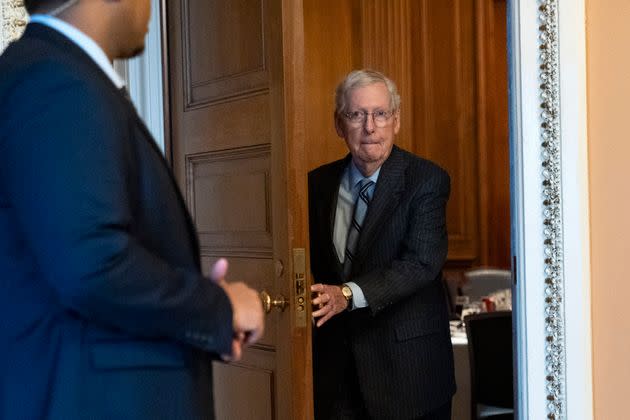
This article is part of HuffPost’s biweekly politics newsletter. Click here to subscribe.
In the days since Senate Minority Leader Mitch McConnell announced he would step down from his role leading Senate Republicans, evaluationsofhistenurehave often deployed a word McConnell loves to use to describe himself: “institutionalist.”
“I love the Senate,” McConnell said Wednesday during a speech on the Senate floor. “It has been my life. There may be more distinguished members of this body throughout our history, but I doubt there were any with any more admiration for the Senate.”
To describe McConnell as an institutionalist, however, is to give him an incredibly short shrift. No single man has done more to shape modern American politics, and the modern Senate, than McConnell. He helped create the era of big-money politics; shaped the Supreme Court’s archconservative majority; and ratcheted up Senate obstruction to new levels. All of those came together to define his relationship with former President Donald Trump, the man who would ultimately take over the GOP McConnell built.
McConnell’s disdain for Trump — and for the business mogul’s isolationist and protectionist policies — has been obvious at times, but he continued to justify working with him to achieve broader conservative goals, even as Trump brought American democracy to the brink. He rarely backed up his tough talk about opposing Trump with hard actions, and is now stepping aside as Trump is poised to seize control of the GOP yet again.
McConnell’s defenders have long portrayed him as holding up the grandest traditions of the upper chamber. But even his longstanding opposition to weakening the filibuster could not stand once it got in the way of an otherwise attainable bit of political power.
Money: Campaign finance and McConnell vs. FEC
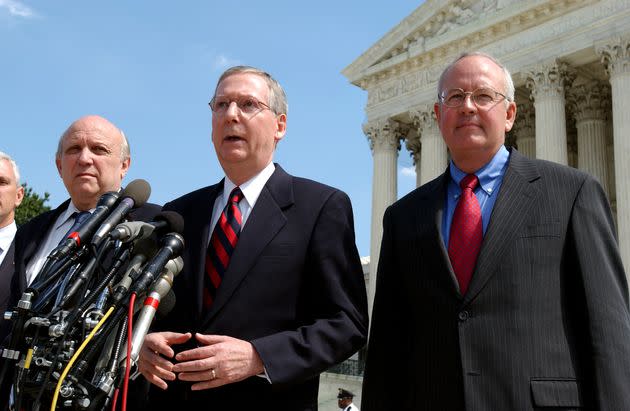
Well before McConnell was a household name, his name was on a 2003 lawsuit against the Federal Election Commission seeking to overturn the McCain-Feingold reform law, which put restrictions on campaign financing. He had led multiple filibusters against it before its final passage.
McConnell’s opposition to the campaign finance reform law flowed from his work raising money for the Republican Party in the 1990s. As momentum built towards reform following the 1996 presidential campaign, McConnell promised, “That will not happen.” But the reform bill did pass in 2002, and was reluctantly signed by President George W. Bush.
The Supreme Court ultimately upheld most of the law. But dissents from the conservative justices laid the groundwork for Citizens United vs. FEC. That case and others led to the super PAC era in American politics, in which donors can give infinite sums — sometimes even anonymously — to PACs that support their chosen candidate.
McConnell does not deserve sole credit here. Democrats, eager to gain fundraising advantages, also contributed: The California Democratic Party, for instance, also sued to overturn parts of McCain-Feingold.
But Americans for Tax Reform head Grover Norquist credited McConnell for essentially waging a solo battle against campaign finance reform in the 1990s and 2000s.
“Mitch McConnell changed the direction of the world,” the conservative political activistwrote on social media. “He stopped the destruction of the Republican Party by opposing, delaying and weakening and ultimately defeating the drive for ‘campaign finance reform’ that would have left union bosses as the sole power in America.”
That battle, along with McConnell’s ownprowess at raising campaign money, helped solidify his support among his GOP colleagues as he sought to lead the caucus.
Obstruction: McConnell in the driver’s seat
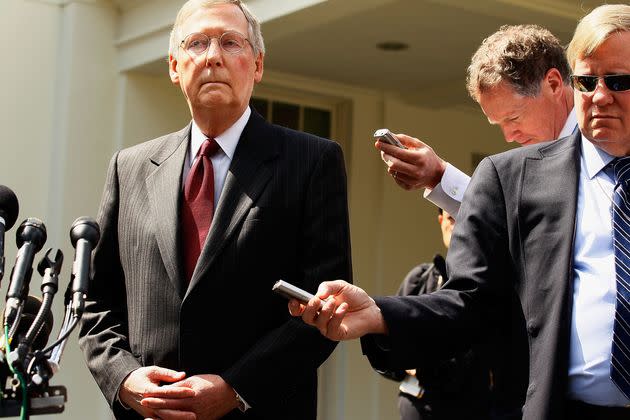
McConnell became the GOP’s Senate leader in 2006, but most Americans first saw his impact in 2009, when Obama entered the presidency amid lofty rhetoric about bipartisanship. McConnell ensured thatrhetoric would not become reality.
He made the GOP’s main strategy one of obstruction, pressuring Republican senators not to break off and support Obama administration policies — even if somewould later go on to support bipartisan deals on immigration and gun control during Obama’s second term. The use of the filibuster — a procedural hurdle requiring bills to receive 60 votes instead of 50 to pass — went from a tactic to an expectation.
He put it bluntly in an interview in October 2010: “The single most important thing we want to achieve is for President Obama to be a one-term president.”
His obstructionist goals culminated in 2016, when he refused to meet with or consider Obama’s nomination of then-D.C. Court of Appeals Judge Merrick Garland to serve on the Supreme Court (more on this later).
Once Trump became president, however, the reputation McConnell had earned as a master tactician faltered. His long-hyped, long-awaited attempt to repeal Obamacare went down with the late Sen. John McCain’s thumbs-down “no” vote in July 2017.
“Can you believe that Mitch McConnell, who has screamed Repeal & Replace for 7 years, couldn’t get it done. Must Repeal & Replace ObamaCare!” Trump tweeted.
But Trump and McConnell’s efforts to stop Democrats’ expansion of health insurance had permanently failed. Republicanssuccessfully passed tax cuts favoring corporations and the wealthy — the GOP equivalent of low-hanging fruit — later in 2017, but that was the last of their legislative accomplishments.
The Courts: Destroying Senate norms to confirm judges
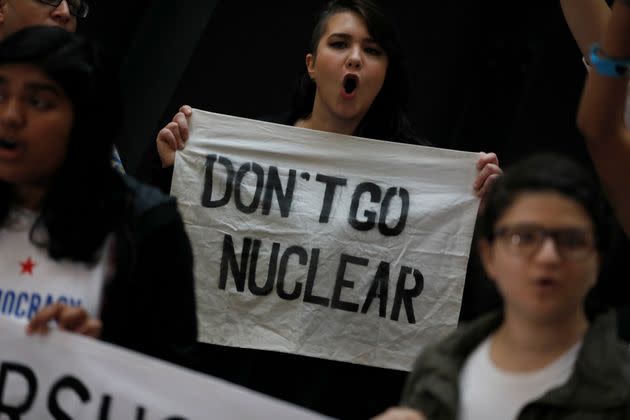
Arguably, McConnell’s most lasting legacy is how he reshaped the nation’s courts — and blew up Senate norms to put as many conservatives into lifetime federal judgeships as possible.
He will forever be remembered for denying a Supreme Court seat to President Barack Obama. In February 2016, barely an hour after Justice Antonin Scalia had died, McConnell made the unprecedented announcement that he would block any Obama nominee to fill the vacancy, saying voters should first choose the next president in November and allow the winner to appoint the next justice.
Trump won in November, and when Democrats filibustered his appointment of Neil Gorsuch, McConnell used the Senate’s rarely invoked “nuclear option” and eliminated the filibuster — an institution he had longdefended — for Supreme Court nominees. Thanks entirely to that change, Republicans were able to confirm Gorsuch.
Three years later, when Justice Ruth Bader Ginsburg died in September 2020, McConnell ignored his own precedent and raced to fill the vacancy with Amy Coney Barrett just weeks before Joe Biden was elected.
McConnell delivered both of those vacancies to Trump, who reliably filled them, along with a 2018 vacancy, with conservative picks. Without McConnell, Trump would have filled justone seat, and today’s Supreme Court wouldn’t have its current 6-3 conservative supermajority — responsible for the court’s most stunning decisions in recent years, including the overturning of Roe v. Wade.
Asked Wednesday to name McConnell’s greatest accomplishment, Senate Republicans said the same thing again and again: his hand in reshaping the Supreme Court.
“Gorsuch, Kavanaugh and Coney Barrett,” Sen. Kevin Cramer (R-N.D.) told HuffPost. “For sure.”
McConnell is also how Trump was able to put more than 230 people into lifetime federal court seats, a massive number of judges to confirm in a single presidential term. McConnell made judicial confirmations his top priority as Senate majority leader, and he worked closely with Trump’s White House and the Federalist Society to keep the pipeline of district and appeals court nominees flowing. Virtually all were male, white right-wing ideologues.
By the end of Trump’s term, he had filled almost every vacancy on a U.S. appeals court. Nearly one in every three U.S. appeals court judges was a Trump pick by the end of 2020.
“Mitch’s tenure has had many legacies, but no legacy is more consequential than the nomination and confirmation of hundreds of principled constitutionalists to the federal judiciary,” Sen. Ted Cruz (R-Texas), a member of the Judiciary Committee who has butted heads with McConnell, told HuffPost Wednesday. “That is a lasting benefit to the American people, for which I’m deeply grateful.”
Opposing Trump, But Never Enough
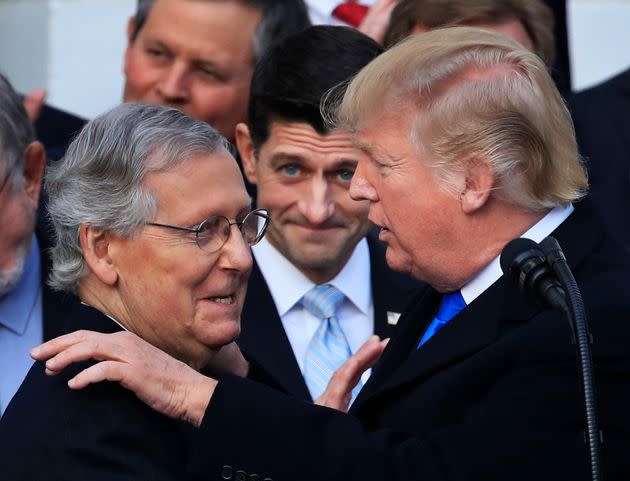
McConnell had to do business with Trump to win the courts.
The relationship between the two Republican leaders was always rocky. Trump ran in the 2016 GOP primaries as a hard-right insurgent against the party elite, including McConnell. His victory forced longtime party leaders to find common ground where they could. For McConnell, thatmeant blunting Trump’s populist and anti-internationalist instincts while getting what hecould out of him.
Trump appointed McConnell’s wife, Elaine Chao, to be his Transportation Secretary, a conciliatory move following Trump’s election-year attacks on the Senate leader. McConnell, meanwhile, covered for Trump’s most inflammatory conduct, brushing off the continued operation of his business as it received millions from foreign governments and claiming ignorance of Trump’s bizarre tweets.
After their legislative ups and downs, the relationship between the two Republicans became increasingly frosty, until it ultimately fractured with Trump’s 2020 re-election loss to Biden. When Trump lied and claimed that he had won, McConnell humored him, stating that Trump was “100% within his rights to look into allegations of irregularities and weigh his legal options.”
Then came the insurrection on Jan. 6, 2021. As Trump directed a mob of supporters to march on the Capitol as electoral votes were being counted, McConnell and the rest of Congress were forced to flee from the violent assault. In a speech from the floor of the Senate after the insurrectionists were cleared, a furious McConnell said that the Senate would not “bow to lawlessness or intimidation” from “thugs, mobs or threats.”
The next day, McConnell reportedly told journalist Jonathan Martin that he was “exhilarated” by the fact that Trump had “finally, totally discredited himself.”
“He put a gun to his head and pulled the trigger,” McConnell told Martin, according to his book, “This Will Not Pass.”
But Trump had not discredited himself — not in the eyes of his followers, nor in the eyes of the conservative media that relies on those followers to profit. All Trump had done was to load the metaphorical gun and leave it for McConnell to pull the trigger.
McConnell refused.
Trump’s second impeachment trial in the Senate, this time for incitement of insurrection, would be the first impeachment of a president who’d already left office. This bit of unprecedented procedure gave McConnell an excuse to let Trump slide.
Seven Republicans joined the entire Democratic Party caucus to vote to convict Trump — 10 votes short of the total needed for conviction. McConnell was not among them.
“There is no question that President Trump is practically and morally responsible for provoking the events of that day,” McConnell said afterwards. “The people who stormed this building believed they were acting on the wishes and instructions of their president.”
But McConnell claimed that a post-office impeachment was unconstitutional. This proved highly consequential: Had Trump been convicted, the Senate could have banned him from seeking office in the future, preventing him from running for president again.
And then Trump announced he would run again in 2024. His third presidential campaign would focus on valorizing the insurrection he inspired on Jan. 6 and getting revenge on all his enemies — real or imagined, Democrat or Republican.
And yet McConnell is in talks to endorse Trump, whom he has labeled as “despicable” and “practically and morally responsible” for Jan. 6.
McConnell’s relationship with Trump, in all its ups and downs, shows what lies at the heart of the soon-to-be-departing Republican leader’s career: Personal humiliations, policy losses and threats to the constitutional order were all part of the price he paidfor Neil Gorsuch, Brett Kavanaugh and Amy Coney Barrett.
That deal, however, looks better for Trump. On the same day McConnell announced his forthcoming retirement as leader, the Supreme Court said it would hear arguments on April 22 on Trump’s absurd claim of “absolute immunity” from prosecution for his actions surrounding Jan. 6.
The decision to take up the case for arguments could fatally delay Trump’s prosecution, helping him win re-election, whereby he could become immune from prosecution or even pardon himself.

